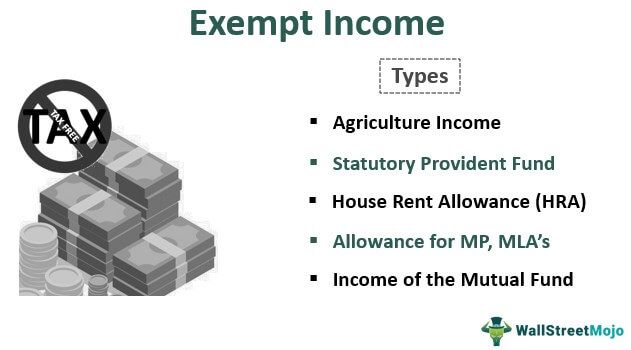Table Of Contents
Exempt Income Meaning
Exempt Income is an income earned by an individual that is not taxed under the revenue laws of the country or the state laws. In simple words, it means there are certain sources of income that are not taxed by the government/law and therefore it doesn’t form part of the total taxable income.

Explanation
The income of an individual or a business entity is classified under different heads in different countries under their state / central taxation laws, and there are certain incomes which the country determines as not to be taxed. Such income is considered classified as exempt income in the law.
There are various types of income which are considered as exempt; few can be enlisted below,
- The employer for the employees extends health benefits.
- Employer-sponsored insurance plans
- Income earned by government / local bodies
- Income earned by the bodies incorporated for employee benefit plans. E.g., EPFO
- The income of individuals holding governing positions in the country
- The Revenue Department exempts certain incomes that help the economy grow by attracting foreign direct investment in-country, providing technological advancement to the country, helps in generating employment, etc. Such a decision is taken in agreement with government ideology to provide a boost to the economy.
- Income earned by the scientific research organization or other such government bodies
- Retirement benefits for individuals are specifically classified as exempt.
- Ex-gratia incomes
- Certain incomes which are related to education and personal development;
Types of Exempt Income
Exempt income as per Indian laws are given under Chapter III, Section 10 of the income tax act 1961, the following is the extract of certain income given under the said section,
- Agriculture Income
- Sums received by an individual as a member of Hindu Undivided Family
- Income received under revised pension rule of the central government in the form of Gratuity
- Any compensation received by a workman under the Industrial Disputes Act, 1947
- The compensation received in case of any disaster
- Statutory Provident Fund
- Recognized Provident Fund
- Superannuation Fund
- House rent allowance (HRA)
- The income of the Mutual Fund
- Allowance for MP, MLA’s
- The income of investor protection fund
- The income of provident and superannuation fund
- The income of the Employees State Insurance Fund
- The income by way of dividend from Indian Company (subject to max 10 lakhs)
- The income from units of Mutual fund
- The income from Securitization trust
- Scholarship
- The income of the local authority
Revenue vs Income Explained in Video
Difference Between Exemptions and Deductions
To understand exemptions, we need to know the difference between exemptions and deductions –
The word exemptions and deductions are sometimes interchangeably used, but there is a significant difference between the two. Deduction means the reduction of a specific amount from the income, which is chargeable under the income tax act. In contrast, exemption means the entire income is excluded from being tax viz. The amount is not subject to the levy of Income-tax.
Therefore, we can say that in the case of exempt income, the entire income will be tax-free irrespective of the amount. In deduction, a certain portion of the expense, specified in the law, is considered as a deduction to the taxable income.
Which Income Tax Act Governs Exempt Income?
Exempt incomes in India are governed by the Income Tax Act 1961, under chapter III, section 10. Below are most commonly found exempt items –
- Agriculture Income
- Sums received by an individual as a member of Hindu Undivided Family;
- Income received under the revised pension rule of the central government in the form of Gratuity.
- The income of the local authority
- The income of Scientific Research Association
- House rent allowance (HRA)
There are various amendments made every year under the Finance Act whereby there can be additions or deletion or modification of conditions for an exempt income. Therefore the latest Income Tax Act should be considered for understanding for a particular financial year, and the same should be read with the relevant Finance Act.
Investments with an Exempt Income
The income accrued from certain investments is considered as exempt for taxation. Individuals use such investments for income tax savings and planning. Generally, the tax savings investments are required to be made within the financial year to avail tax benefit of the principal portion, and the income portion of the investment is 100% exempt when received at the maturity of the investment
There are various investment avenues; a few are enlisted below,
- Tax savings Fixed Deposits
- Life insurance policies
- Employee pension funds
- Employee provident funds
- Post office deposit
- Tax-free bonds issued by government enterprises
- Tax saving mutual funds
- ELSS Investments
Such investment is long term in nature and has a lock-in period, which ranges from 5 years to 15 years depending upon the type of security.
